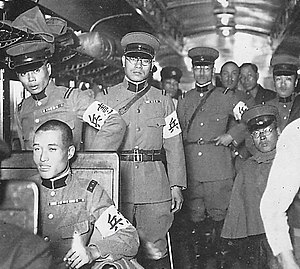59th "Coal Miners"
 A small team of "Miners" readying themselves to arrest a suspected terrorist group, 1979. | |
| Gendarmerie overview | |
|---|---|
| Formed | March 30, 1962 |
| Dissolved | 7 June 2001 |
| Jurisdiction | Jerku |
| Headquarters | New Johr, Jerku |
| Employees | 1200 (2000) |
The 59th "Coal Miners" (also known as The 59th and The Coal Miners), was the military police arm of the Jerkuan Socialist Army from 1962 to 2001. It was both a conventional military police and a secret police force. In Jerku, the Coal Miners also arrested or killed those who were suspected of being anti-Jerku and against the Social Democratic regime.
The Battalion was known for their underground works, with almost half of their operations was unknown until it was revealed a year later. Their works was mostly either executing suspected political opponents, which was deeply researched beforehand, or stopping any threats such as terrorist group, coup,…
Name
The 59th "Coal Miners" is the code name of the battalion during their period of army service, which previously was the "Coal Finders" or more appropriately was the "Miners". The code name was created because out of 1200 men, there were 1000 of them that came from the province of Jarl, a province famous for their coal production.
History
The Coal Miners was established in 1962 by a decree made in the new constitution of the Social Democratic regime, figuratively "articles concerning gendarmes". Details of the Coal Miner's military, executive, and judicial police functions were defined by the Jerkuan Military Policies of 1962, which was amended twenty-six times before Jerkuan anarchy in 2001.
The force initially consisted of 900 men. The enforcement of the new conscription legislation was an important part of their duty, due to resistance from intellectual families. The Coal Miner's general affairs branch was in charge of the force's policy, personnel management, internal discipline, as well as communication with the Ministries in the government. The operation branch was in charge of the distribution of military police units within the army, general public security and intelligence.
The Coal Miners maintained public order within Jerku under the direction of the Internal Affair Minister. Jerku also had a civilian secret police force, "Bamboo Shoots". However, the Coal Miners had a Bamboo branch of its own, and through it discharged the functions of a secret police.
When the Coal Miners arrested a civilian under the direction of the Justice Minister, the arrested person was nominally subject to civilian judicial proceedings.
Near the end of regime, the force was more brutal then what it's used to be, a larger and more brutal operation and multiple out of order mission by the battalion themselves was carried out. When the anarchy started, they formed their groups and held a small territory in Jarl province.
Organization
The Coal Miners maintained a headquarters in each relevant Area Army, commanded by a Major General with a Colonel as Executive Officer and comprising two or three field offices, commanded by a Lieutenant Colonel and with a Major as executive officer and each with approximately 245 personnel.
The field office in turn was divided into 65-man sections called "Carts". Each was commanded by a Captain with a 1st Lieutenant as his Executive Officer and had 65 other troops. The Carts were further divided into detachments called Pickaxes, commanded by a 2nd Lieutenant with a Warrant Officer as Executive Officer and 20 other troops. Each detachment contained three squads: a police squad, an administration squad, and a special duties squad.
Coal Miners Auxiliary units consisting of province ethnic forces were organized in Jerku smaller division areas. These troops supplemented the Coal Miners and were considered part of the organization but were limited to the rank of Sergeant Major.
By 1970 the Coal Miners had 205 officers in the 1200 enlisted soldiers. These were the members of the known, public forces.
Active units
The Coal Miners operated commands on the Jerkuan mainland and its islands off Gulf as well as the island of Hachi. The external units operating inside and outside Jerku were:
Inside Jerku
First Field Coal Miners – largely based in the east of Jerku, worked with the 29th "Thunder Eagle" Battalion.
Second Field Coal Miners – largely based in central Jerku with 75% of the battalion staffs are ethnic minorities, worked with the 23rd "Wandering Ghost" Company.
Third Field Coal Miners – largely based in the West of Jerku, the field was more technologically advanced the two three others field due to their area of fast advancement, worked with the 60th "Burning Tree" Company.
Outside Jerku
Fourth Field Coal Miners - all are based on the sea, with Port Ma Beifa as the headquarter.
Mission
The Coal Miners was responsible for the following:
Travel permits
Labor recruitment
Counterintelligence and counter-propaganda (run by the Bamboo-Coal as 'anti-ideological work')
Supply requisitioning and rationing
Psychological operations and propaganda
Rear area security
By 2000, despite the obvious tide of ideological madness in Jerku, the Coal Miners were arresting people for anti-government sentiment.
Other intelligence sections
Coal Miners was responsible for watching exterior enemies or suspicious persons and watching inside of own unit for possible defectors or traitors; and the miss usage of the security doctrine.
Overseas Security (whic is the Fourth Field Coal Miners) dedicated to the maintenance of security of territories outside Jerku mainland. This also undertook some administrative responsibilities.
The Coal Miners was divided into:
Bamboo Choppers (Police and security)
Diamond Miners (Administration)
Cart Pushers (Special Duties)
